Disease X concept explained by WHO doctor in 2018
Leading British scientist Professor Mark Woolhouse said “it is when, not if” another global disease shakes up the world. Colleagues of his at the World Health Organisation (WHO) warned of the novel coronavirus four years prior to the pandemic. Will world governments take more notice this time around? Professor Woolhouse remembers discussing the next emerging pandemic years ago, with experts suggesting at the time it could be related to MERS or SARS. “I mean, it really couldn’t be more accurate than that,” he said about Covid.
“This new virus is so closely related to SARS, so they absolutely pin-pointed it as one of the threats.”
For the past 50 years, every year or so, scientists discover new viruses.
“That’s going to keep happening,” warned Woolhouse, the challenge being “picking up the ones that are actually going to cause the next pandemic”.
This week marks the first year anniversary since the first coronavirus case was reported in the UK.

We will use your email address only for sending you newsletters. Please see our Privacy Notice for details of your data protection rights.
A year on, the NHS hospitals are at breaking point, the nation is under a national lockdown – not knowing when restrictions really will be lifted – and more than 100,000 British people have lost their lives.
The likelihood of the next pandemic emerging relatively soon is the same as much further down the line.
“We can’t put a handle on when [the next pandemic will occur],” said Woolhouse.
“The precise mechanism by which a virus comes out is always extremely unpredictable,” he explained.
DON’T MISS
Covid new strain symptoms: Four ‘more common’ signs of coronavirus new variant infection [SYMPTOMS]
Credit card & personal loan lenders may ‘flood’ consumers with deals [ANALYSIS]
Are parks open in lockdown? [EXPLAINED]
“You can never predict precise events, so you have to do it on sort of statistical grounds probability.”
However, with Britain still battling the current Covid nightmare, Woolhouse worried: “I’m not sure that there’s a lot of thinking going on about the next threat.”
Woolhouse added that “there needs to be more thought about that”, but trying to guess what the next disease will be is “very risky”.
Source: Read Full Article
